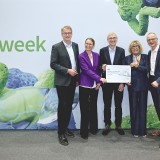Notes to Editors
For further information, or to arrange an interview with Laura Bolte please contact Luke Paskins on +44 (0) 208 154 6393 or [email protected]
We kindly ask that a reference to UEG is included when communicating any information within this press release.
About Laura Bolte
Laura Bolte is a dietitian and MD PhD candidate at the Department of Gastroenterology and Hepatology at the University Medical Center Groningen (UMCG), Groningen, Netherlands. Laura Bolte’s co-authors were Dr Johannes Björk and Dr. Karla Lee. The project was supervised by Professor Rinse Weersma and Professor Geke Hospers, both of the University Medical Center Groningen.
About UEG
Founded in 1992 United European Gastroenterology (UEG) is the leading non-profit organisation for excellence in digestive health in Europe and beyond with its headquarters in Vienna. We improve the prevention and care of digestive diseases in Europe through providing top tier education, supporting research, and advancing clinical standards. As Europe’s home for multidisciplinary gastroenterology, we unite over 50,000 engaged professionals from national and specialist societies, individual digestive health experts and related scientists from all fields. With our innovative online platform, the myUEG Community, we enable digestive health professionals from across the globe to connect and benefit from a plethora of outstanding free resources and educational activities. Our offers include UEG Week, our annual congress, online and face-to-face educational experiences, research support, a scientific journal, and a range of opportunities in the form of fellowships and grants. We provide numerous guidelines, standards and quality improvement initiatives and campaign at the European level to ensure continued resources for research into digestive health while working closely with patient organisations.
Find out more about UEG’s work by visiting www.ueg.eu or contact:
Luke Paskins on +44 (0) 208 154 6393 or [email protected]





Please log in with your myUEG account to post comments.